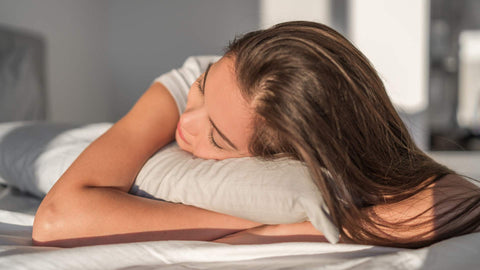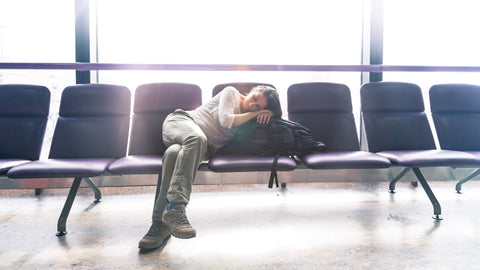Feeling exhausted after a full night's sleep can be frustrating and confusing. You've done everything right - gone to bed early, slept for the recommended 8 hours, yet you still wake up feeling drained. The quality of your sleep matters just as much as the quantity, and various factors can impact how refreshed you feel in the morning.
Your sleep cycle, sleep environment, and overall health all play crucial roles in determining how rested you feel upon waking. Sleep disorders like sleep apnea, restless leg syndrome, or insomnia can prevent you from achieving deep, restorative sleep. Additionally, your lifestyle choices, such as diet, exercise habits, and stress levels, can significantly affect your sleep quality.
Understanding the reasons behind your persistent tiredness is the first step towards improving your sleep and overall well-being. By examining your sleep habits, addressing potential health issues, and making simple lifestyle adjustments, you can enhance your sleep quality and wake up feeling more energized and ready to tackle the day.
Understanding Sleep and Its Impact on Health
Sleep plays a vital role in your overall health and well-being. It affects your physical restoration, cognitive function, and emotional balance.
The Science of Sleep Cycles
Your sleep consists of multiple cycles, each lasting about 90-120 minutes. These cycles include light sleep, deep sleep, and REM (Rapid Eye Movement) sleep. Deep sleep is crucial for physical restoration and recovery. During this stage, your body repairs tissues, strengthens the immune system, and consolidates memories.
REM sleep, on the other hand, is essential for cognitive function and emotional regulation. This is when most dreaming occurs, and your brain processes information from the day. A typical night's sleep should include 4-6 complete cycles for optimal rest.
Factors Affecting Sleep Quality
Several factors can impact your sleep quality. Stress and anxiety can make it difficult to fall asleep or cause frequent waking. Your diet and exercise habits also play a role. Heavy meals close to bedtime can disrupt sleep, while regular physical activity can improve it.
Your sleep environment matters too. A cool, dark, and quiet room promotes better sleep. Exposure to screens before bed can interfere with your natural sleep-wake cycle due to the blue light emitted.
Caffeine intake, especially in the afternoon or evening, can significantly affect your ability to fall asleep. Similarly, alcohol might help you fall asleep faster, but it often leads to poor quality sleep later in the night.
Common Sleep Disorders
Sleep disorders can severely impact your sleep quality and overall health. Insomnia, characterized by difficulty falling or staying asleep, is one of the most common. Sleep apnea, where breathing repeatedly stops and starts during sleep, can lead to daytime fatigue and health complications.
Restless legs syndrome causes an irresistible urge to move your legs, often disrupting sleep. Narcolepsy, a neurological disorder, results in sudden sleep attacks during the day and disturbed nighttime sleep.
If you consistently feel tired after a full night's sleep, it's worth considering whether a sleep disorder might be the cause. Consulting a healthcare professional can help identify and address these issues, improving your sleep quality and overall health.
Lifestyle Changes for Improved Rest
Making strategic adjustments to your daily habits can significantly enhance your sleep quality and help you wake up feeling refreshed. Focus on optimizing your sleep environment, adjusting your diet and exercise routine, and managing stress levels.
Optimizing Sleep Hygiene
Create a consistent sleep schedule by going to bed and waking up at the same time every day, even on weekends. This helps regulate your circadian rhythm. Keep your bedroom dark, quiet, and cool, ideally between 60-67°F (15-19°C). Invest in a comfortable mattress and pillows that support your preferred sleeping position.
Establish a relaxing bedtime routine to signal your body it's time to wind down. This might include:
- Reading a book
- Taking a warm bath
- Practicing gentle stretches or yoga
Limit screen time before bed, as blue light from devices can interfere with melatonin production. Consider using blue light blocking glasses or apps if you must use devices in the evening.
Diet and Exercise's Role in Sleep
Your eating and activity habits play a crucial role in sleep quality. Avoid heavy meals close to bedtime, as digestion can disrupt sleep. Instead, opt for a light snack if needed. Limit caffeine intake, especially in the afternoon and evening.
Regular physical activity can improve sleep quality, but timing matters:
- Aim for 30 minutes of moderate exercise most days
- Complete workouts at least 3 hours before bedtime
- Morning or early afternoon exercise can help regulate your sleep-wake cycle
Stay hydrated throughout the day, but reduce fluid intake close to bedtime to minimize nighttime bathroom trips.
Coping with Stress and Anxiety
High stress levels and anxiety can significantly impact your ability to fall asleep and stay asleep. Incorporate stress-reduction techniques into your daily routine:
- Practice meditation or deep breathing exercises
- Try progressive muscle relaxation before bed
- Keep a worry journal to jot down concerns and potential solutions
Consider limiting news consumption, especially before bed, to reduce anxiety. Create boundaries between work and personal time to allow your mind to unwind. If stress persists, don't hesitate to seek support from a mental health professional.
Develop a gratitude practice by noting three things you're thankful for each day. This positive focus can help calm your mind and promote restful sleep.



